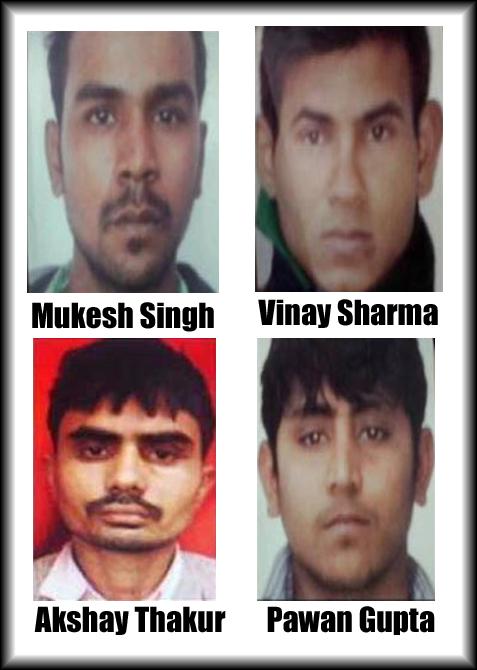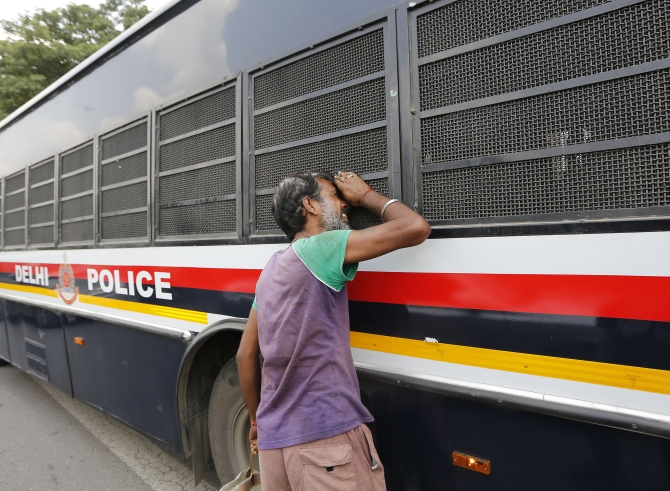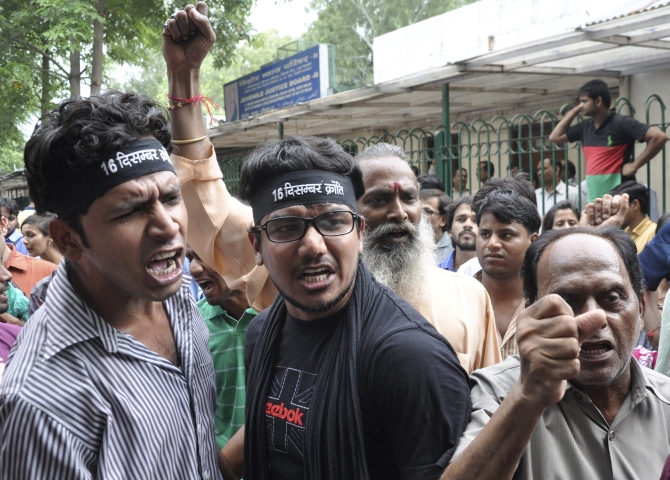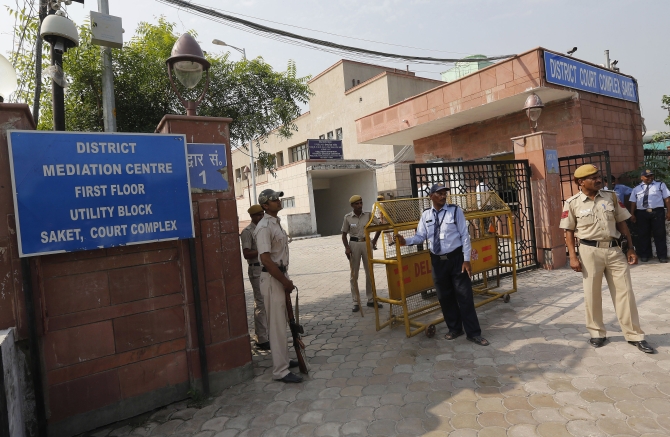
Less than nine months after the December 16 brutal gang rape incident, a fast track Delhi court on Tuesday held all the five accused, including a man who died during the trial, guilty of rape and cold blooded murder of a "defenceless" 23-year-old girl that can fetch them death.
The quantum of sentence to convicts -- Mukesh, Vinay Sharma, Pawan Gupta and Akshay Thakur--in the case that shook the nation's conscience will be argued on Wednesday before Additional Sessions Judge Yogesh Khanna, who delivered 237-page judgement.
"The facts of the case make all accused liable for the cold blooded murder of the defenceless prosecutrix and thus the offence under Section 302 (murder) read with Section 120B (criminal conspiracy) of the Indian Penal Code stands proved and the accused persons are thus convicted," the judge said. "... all the accused in pursuance of the conspiracy committed gang rape with the prosecutrix and thus are convicted under section 376(2)(g) (gang rape) of the IPC with the aide of section 120B IPC," the court said.
Rejecting the defence argument that the girl had died due to delayed medical aid and infection caught in the hospital during treatment, judge Khanna observed that "the important aspect of this trial is the manner in which both rods and hands were used for damaging the alimentary canal and pulling it out from the body (of the girl).
"This act of complete destruction of the most vital parts of the body can never be termed as intending to cause bodily injuries and rather it will be act done with intention of causing death."
The judge said they had conspired to gang rape her and the crime had been committed in a "premeditated manner". the prosecutrix in pursuance to their conspiracy," the court said.
In his judgement, the judge said, "Circumstances, conduct and overt act of the accused persons narrated/described clearly establish that accused persons had attempted to kill the complainant."
The December 16 incident in which the paramedic was savagely gang rape d and brutally assaulted led to nationwide streets protest that heralded changes in the law. The changes provide even for death in the case of rape but the present case was heard under the old provisions of IPC that provides a maximum sentence of life term for rape.
The fifth convict Ram Singh had committed suicide in Tihar Jail in March. Sixth convict was a juvenile at the time of the incident and has been given a maximum of three years sentence in a reformation home.
...

In his judgement, the judge said, "Circumstances, conduct and overt act of the accused persons narrated/described clearly establish that accused persons had attempted to kill the complainant."
The December 16 incident in which the paramedic was savagely gang rape d and brutally assaulted led to nationwide streets protest that heralded changes in the law.
The changes provide even for death in the case of rape but the present case was heard under the old provisions of IPC that provides a maximum sentence of life term for rape.
The fifth convict Ram Singh had committed suicide in Tihar Jail in March. Sixth convict was a juvenile at the time of the incident and has been given a maximum of three years sentence in a reformation home.
The judge said even though proceedings against accused Ram Singh, 34, were abated on his death, "he is also convicted under same sections (gang rape, murder and other offences)".
Soon after the verdict was delivered, Pawan broke down while Vinay was in a state of shock.
Mukesh was heard saying that "they would have to face the consequences for what they have done". Another convict Akshay seemed unaffected.
In his judgement, the judge said, "The act of abducting the victim by deceit, robbing, causing injuries and the act of some accused in pinning the complainant (male friend) while others took their turns in committing rape/unnatural sex and while one of them continued driving the bus and lastly throwing them out of the moving bus, sharing booty, destroying evidence thoroughly show illegal agreement between them to commit such illegal act and they had knowledge of the same."
Dealing extensively with the DNA analysis of the material collected by the probe agency, the court said, "DNA analysis duly establish the identity of victim and of the accused persons beyond doubt to be the persons inside the bus at the relevant time."
...

He was also grateful to Amicus Curiae Rajiv Jain and the defence counsel.
"Lastly, I also feel it necessary to mention the professional acumen with which the Delhi police investigated the case especially the way they made use of the scientific tools. I hope this would be replicated in all other cases.
Besides gang rape, murder and conspiracy, the court held Mukesh, 26, Vinay Sharma, 20, Pawan Gupta, 19, and Akshay Thakur, 28, guilty of attempt to murder, unnatural offences, dacoity, destruction of evidence, kidnapping or abducting in order to murder, while acquitting them of the charge of murder in dacoity.
The court also convicted them for kidnapping or abducting with intent to secretly and wrongfully confining a person, abducting to subject a person to grievous hurt and slavery, abducting woman to cause her defilement, voluntarily causing hurt in committing robbery and dishonestly receiving property stolen in the commission of a dacoity of the IPC.
On the fateful night, Ram Singh, Vinay, Akshay, Pawan, Mukesh and the juvenile had gang rape d the girl in a bus after luring her and her 28-year-old male friend, who was also assaulted, on board the vehicle, which was later found to be plying illegally on Delhi roads.
The victim's friend, a software engineer, had fractured his limbs in the incident. The girl succumbed to her injuries on December 29, 2012 at a Singapore hospital. The court relied on the dying declaration of the victim, forensic evidence, including finger prints, dental models, DNA samples and other medical reports of the convicts, electronic evidence and the statements given by them to the police after their arrests.
The judge also said that the presence of the convicts in the bus in which the crime was committed has been established through the location of their mobile networks.
The court inferred the prior meeting of minds of the accused as it noted that after robbing the carpenter Ram Adhar, they again brought the bus to Munirka bus stand where they enticed the victim and her male friend to board the vehicle making them believe that it was a public carriage.
"The conduct of the accused in not allowing anyone else to enter the bus after the victims had boarded it and to move immediately away from the bus stop speak of their unlawful object and their prior meeting of minds," the ASJ said.
“The conduct of all the accused lead to only inference that they have conspired together to commit various offences with passengers who would board the bus. Their acts of allowing only a single person/unit to board the bus on each occasion speaks volume of their common object," he added.

"First of all, she (girl) was humiliated and her clothes were torn and pulled away from her body. She was hit by iron rods on the abdomen. Thereafter, she was gang raped by six persons one by one and when her body became devoid of any resistance due to these factors, the iron rods and hands were inserted into the abdominal cavity through... repeatedly in a forceful manner which completely damaged the alimentary canal and during the process of pulling out of the rods and hands, the major part of her intestine was pulled out from the body," the court said.
The judge added this aspect shows the severity of the injuries caused to the victim and the cause of her death was direct consequences of the multiple injuries sustained by her.
The court also said the circumstances "rule out the possibility of use of rods to overpower the girl. The acts of inserting rods and pulling out internal organs and committing the gang rape can in no manner be seen as acts done only to facilitate gang rape. Rather, the act of pulling out the internal organs of the victim to kill her was intentional."
The court said the accused persons adopted a unique modus operandi to do acts and it was an "intended act done with the sole intention of causing death."
"The accused persons adopted a unique modus operandi to do the acts. They, besides causing external injuries, inserted rods in the abdomen of the victim. They did the act repeatedly and pulled out vital internal organs even by their hands. All these circumstances made the act of the accused an intended act done with sole intention of causing death.
While convicting them under Section 397 (robbery or dacoity, with attempt to cause death or grievous hurt) of the IPC, the court held the conspiracy among the accused persons stands proved and the question as to who caused the injury and who used the weapons is of no significance. It also held them guilty of abducting the girl with the intention of illicit intercourse considering their act of making the victim believe that the bus was a public carrier proceeding to Dwarka and moving immediately away from the bus stand after they boarded the vehicle.
Convicting the accused for the murder of the girl, the court said "it stands proved that the girl died due to injuries inflicted by the accused while committing various offences with the victims inside the moving bus on the fateful night of December 16, 2012.
...

"Such injuries have been described by the doctors as dangerous, extremely bad for definite repair, sufficient in ordinary course to cause death."
The court also referred to a part of dying declaration of the girl in which she had described how she was beaten up by the accused persons with rods, which were also inserted in her body, and held that "the accused persons did the acts only with the intention of causing death."
The judge also noted that the girl was lean and thin from physique and after she boarded the bus with her friend, the accused did not allow any other person to board it.
The judge noted that the accused used filthy language, beat up the complainant and torn off the clothes of the girl, switched off the lights inside the bus and took her in its rear end.
"All these acts were done in a very short span of time and were capable of creating fear factor in the mind of the girl...," the court said.
The court also derived the intention of the accused to kill the victims from the fact that after the crime, they were thrown into the bushes in a naked condition on a winter night so that there presence could not be easily noticed by passers-by.
Also holding them guilty of attempting to murder the victims, the court said, "They first attempted to throw them out of the moving bus from its back door but since it was jammed, they dragged both the victims in an injured, unconscious and naked condition by pulling their hairs to the front door of the bus and presuming them to be dead, threw them out on a chilly night, that too at a very dangerous place, the main Jaipur highway."
The court, however, acquitted the four from Section 396 (dacoity with murder) of the IPC as it held that the accused persons had not assaulted the victims with the intention of robbing but that they had attacked her with the intention of gang-raping her.
The judge in his detailed judgement discussed the accused's plea, including that their arrest as illegal and the recoveries were planted by the police officials at the behest of seniors. The court, however, said the evidence of the police officials associated in the arrest of the accused are found to be "trustworthy".
"The accused have not been able to create any dent in the story of the prosecution qua the manner of their arrest. Even otherwise, I may go to the extent of saying that illegality in arrest, if any, has no bearing on the trial of a case," the judge said.
"I have meticulously examined the deposition, especially the cross examination of police officials associated with the recoveries of the case properties.
"Nothing material has come in their cross-examination which may destroy the substratum of the case of prosecution on the alleged plea that the recoveries were either not made at the instance of the accused or the police officials were never associated with such recoveries," the court added.
It further said the "minor contradiction qua timing etc,do not destroy the fabric of the case and hence needs to be ignored. The defence of accused, being not plausible, stands rejected."
...